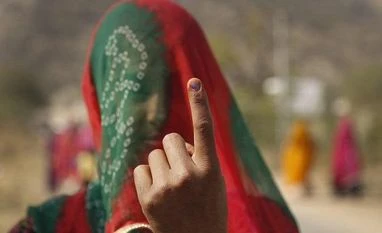The recent civic body elections across 22 of the 33 districts in Gujarat were reminiscent of the assembly poll in December 2017. In both elections, the Bharatiya Janata Party (BJP) won, but lost some ground.
In the assembly election, the BJP won 99 of the 182 seats, down from the 115 it had secured in 2012. Likewise, in the civic poll, its tally plummeted from 59 to 44, of the total 75; the Congress raised its tally to 22, from six.
Voting for the 75 semi-urban municipalities took place on February 17. Simultaneous elections were held for two district panchayats, 17 taluka panchayats and 1,423 gram panchayats. Villagers in 295 gram panchayats chose their sarpanch unanimously.
The civic body polls were held days before the state Budget and BJP sources said the party couldn't do much, since the new government was recently formed. “Yet, the results have been encouraging and we intend to ensure we redeem the lost ground. The Budget was a start and the government hopes to continue to stay true to policies that it has been practising,” said a party senior.
A look at the recent state Budget shows the ruling party is trying to correct past mistakes, including the earlier nonchalance towards the agrarian sector, especially in Saurashtra and south Gujarat.
In the municipal election, the BJP was able to cover some ground in a few constituencies, such as Vadnagar — the hometown of Prime Minister Narendra Modi — where the party won 27 of the 28 seats and the Congress managed only one.
In the Assembly election, the BJP had lost Mehsana district’s Unjha constituency, which includes Vadnagar, to the Congress in the wake of the Patidar quota agitation.
On the other hand, the Congress lost all the three municipalities in Mehsana district, including Kheralu and Vijapur, to the BJP this time.
The BJP also regained strength in Amreli, Saurashtra, represented by Paresh Dhanani, Leader of the Opposition in the state Assembly. The ruling party snatched three of the four municipalities from the Congress in Amreli district; the latter had made a clean sweep in the 2017 state polls.
Woes of another Congress leader Arjun Modhvadia, who had lost from Porbandar in 2017, continued with his party losing all the three municipality polls — Kutiyana and Chhaya to the BJP, and Ranavav to the Nationalist Congress Party (NCP).
In the automobile hub of Sanand (in Ahmedabad district), the BJP bagged 20 of the 24 seats, while the Congress' tally dropped to eight to four.
It was for the first time in over a decade that parties contested the local body elections on their symbol and this reiterated the BJP's majority hold over municipalities in Gujarat since the early 1990s.
However, the civic polls do not paint a clear picture of support, especially from rural areas, said Vidyut Joshi, a political analyst.
“The BJP twice organised felicitation of sarpanches and other winners but only a few were present at those events. Many times when the BJP looks to affiliate winners with the party, they (the latter) do not deny... If a councillor or sarpanch wants work to be done, then he/she has to keep good relations with the party in power,” said Joshi.
Joshi said the recent state Budget was slightly tilted in farmers’ favour.
“The BJP has realised it has to do more for rural areas. But, more could have been done. While there is a 10 per cent rise in overall outlay, no drastic change has been made in any segment,” he said.
Introduction of the nationwide goods and services tax has taken away much of the earlier freedom that the state government had in announcing sops for various sectors. What needs to be seen, Joshi said, is the efficiency in implementing rural- and farm-friendly allocations.
Unlock 30+ premium stories daily hand-picked by our editors, across devices on browser and app.
Pick your 5 favourite companies, get a daily email with all news updates on them.
Full access to our intuitive epaper - clip, save, share articles from any device; newspaper archives from 2006.
Preferential invites to Business Standard events.
Curated newsletters on markets, personal finance, policy & politics, start-ups, technology, and more.
)